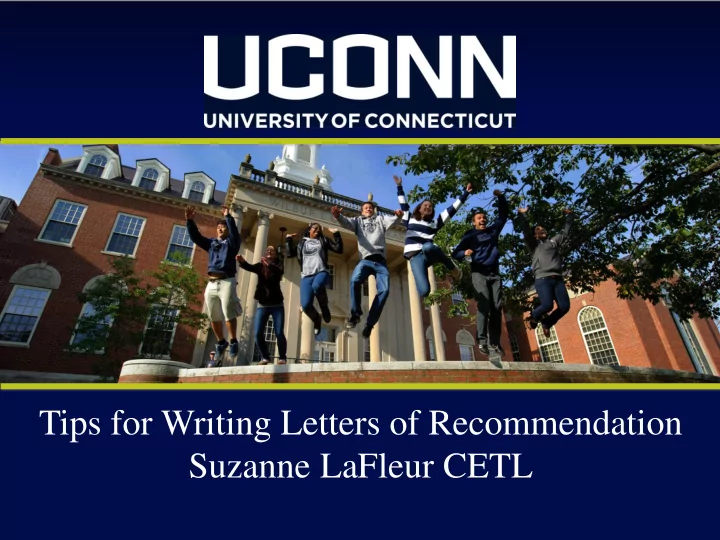

sfreg Tips for Writing Letters of Recommendation Suzanne LaFleur CETL
Agenda • Challenges • Communication • Content • unConscious Bias • Code Words & Phrases • Conclusions • Sample letters from / 2
What types of letters are you usually asked to write? What challenges you when writing letters of recommendation? 3
Communication with the letter requestor • Can you write a strong letter for the applicant? • What are some things to consider? 4
Communication with the letter requestor • It is OK to say no. – Too close to the deadline – You know you don’t have the time – You don’t know the student well enough – You cannot be emphatically positive – Request is unprofessional – Adapted from 5
Communication with the letter requestor • Request Information – Deadline – Details about the request • Purpose • Program • Instructions – criteria of competition • Recipient • Submission process 6
Communication with the letter requestor • Request Information – Current Materials • Resume • Personal statement • Details about related projects • Unofficial transcript • Bullet points of things to include 7
Communication with the letter requestor • Don’t ask students to draft their own letters. 8
Format • Length • Letterhead & Date • Address & Greeting • Text formatting – Font • 10 – 12 • Standard publishing such as New Times Roman or Century – Single Space – Skip lines between paragraphs • Closing 9 Adapted from
Letter Content • What makes a strong letter? 10
Letter Content -- What makes a strong letter? • Credibility – Explain how you know the applicant – Provide clear evidence – Limit your letter to what you know • Focus on the applicant – Examples of what the applicant has done – Merits of the proposed research project, course of study, etc. – Positive impact on the student 11
Letter Content -- What makes a strong letter? • Start strong – Executive summary • Details & examples • Avoid – Summarizing resume – Unsupported praise – Faint praise – Implying criticism 12
Unconscious Bias 13
Bias in letters • Trix & Penska (2003) – More “standout” adjectives for males – Differences in use of possessive phrases • Men – researchers & professionals (his research) • Women – teachers and students (her teaching) 14
Bias in letters • Madera, Helb, & Martin (2009) – Women described as more communal and with less agency • Dutt, Pfaff, Bernstein, Dillard, & Block (2016) – Women half as likely to receive excellent letters / 15
Bias in letters • Houser & Lemmons (2018) – Non-white students described with more affect words and positive emotions – White students described in terms of cognitive ability, insight, and productivity • Gender bias calculator http:// / 16
Female-biased (51%) Graduate Student Janet letter Female-biased (51%) Female-associated words Male-associated words student ×8 course ×6 work ×3 educational Students ×2 project ×3 courses ×5 excellent classes best course, sciences class ×2 exceptionally students, skills responsibility ×2 able students ×3 projects student-run results teaching tested educational materials capable workbook skills, focus, thorough analysis efforts. I colleagues 17 working
Additional Code Words & Phrases • Highest – “my highest recommendation” – “most enthusiastically and without reservations” – “very strongly” • Strong – “strongly” • Qualified – “I am writing to recommend…” – Adapted from www.umich.edu/`mmanty/resources/recommendations/html 18
Other considerations • Define terms • Privacy issues and FERPA – Refrain from referring to the student’s protected classification information (e.g. race, national origin, religion, gender, physical disability, marital status and age) 19
Other considerations • Privacy issues and FERPA – DO NOT share information from student educational records, including grades or grade point averages, with parents or others outside the institution, including in letters of recommendation, without written permission from the student. 20
Other considerations • Talk to the student if you are considering using an example that may reveal personal information 21
Efficiency • Consider posting your recommendation policy • Consider a basic structure – Intro – Academic Substance – Character and personal examples – Summary 22
10 Commandments for Writing Recommendation Letters 23
Recommend
More recommend